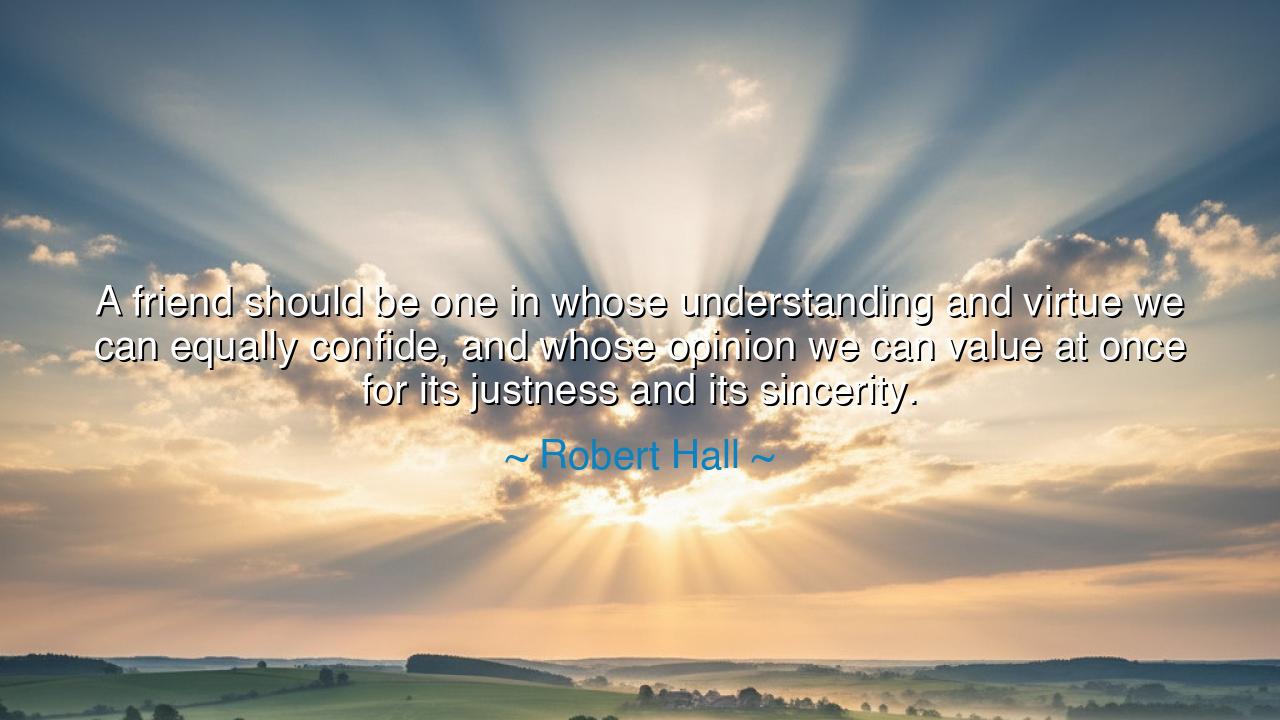
A friend should be one in whose understanding and virtue we can
A friend should be one in whose understanding and virtue we can equally confide, and whose opinion we can value at once for its justness and its sincerity.






The saying, “A friend should be one in whose understanding and virtue we can equally confide, and whose opinion we can value at once for its justness and its sincerity,” flows like a river of light from the pen of Robert Hall, the great English preacher and moral philosopher of the early nineteenth century. His words are not mere counsel for companionship, but a mirror for the soul—a reminder that true friendship is built upon both wisdom and moral strength, upon minds that understand and hearts that are pure. In an age where flattery often replaces truth, Hall’s words strike with the quiet thunder of integrity: a friend must not only be kind, but righteous; not only gentle, but discerning.
In these few words, Hall weaves together two pillars of genuine friendship—understanding and virtue. Understanding alone, without virtue, becomes manipulation; virtue alone, without understanding, becomes cold moralizing. But when both dwell within one soul, they create the rarest of bonds—a friendship that uplifts rather than indulges, that corrects without wounding, and that loves with both heart and reason. Such a friend sees not only what we are, but what we might become; they guard our weaknesses without judgment, and honor our strengths without envy. Their counsel is not born of pride, but of care. Their opinion, even when stern, is a gift forged from sincerity and justness, like a sword that cuts only to heal.
Consider the example of Socrates and Plato, master and disciple, yet also true friends in the highest sense. Plato revered Socrates not merely for his intellect, but for his unwavering virtue—the harmony of mind and moral character that shaped all his teaching. Socrates did not flatter those he loved; he questioned them, provoked them, and led them toward truth. His friendship was not the soft comfort of agreement but the fire that purified the spirit. When Socrates was condemned to death, Plato’s writings preserved not only his teacher’s philosophy but also the immortal bond between truth and friendship—that sacred kinship where respect and honesty walk hand in hand. For what is a friend, if not one who dares to tell us the truth we fear to hear, yet need the most?
The justness of a true friend’s opinion is like a compass to the wandering heart. Many surround themselves with those who echo their desires, who applaud their folly and call it freedom. But the wise man seeks a friend whose counsel pierces delusion. Such a friend does not measure their words to please, but to enlighten. Their silence, when they disapprove, speaks more deeply than the praise of a crowd. Their rebuke, gentle yet firm, becomes a turning point in the story of one’s soul. In their eyes, we find not judgment, but reflection; not scorn, but hope. It is in such company that the spirit grows strong, and life takes on the dignity of purpose.
Yet this kind of friendship is not born in haste. It is forged slowly, like iron in the forge, tested by time, by adversity, and by truth. False friends gather in days of prosperity, when the cup is full and laughter easy. But when the storm comes and the world grows silent, the true friend remains, steady as a flame that refuses to be extinguished. Their understanding comforts, their virtue protects, and their sincerity shines through the darkness. To have even one such companion in life is to possess a treasure greater than gold or glory. For kingdoms may fall, and youth may fade, but the counsel of a righteous friend endures beyond all seasons.
From this teaching of Robert Hall, let us draw a lesson for our own age. Seek not those who merely make you happy, but those who make you better. Do not measure friendship by laughter shared, but by truth spoken. When choosing your companions, ask: Do they understand my heart? Do they strengthen my virtue? Do they speak with sincerity, even when it pains me to hear? For in such questions lies the secret of choosing those whose presence will elevate your spirit rather than flatter your ego.
And finally, be to others the kind of friend you wish to find. Let your words be honest, yet kind; your opinions, grounded not in pride, but in love; your understanding, deep and patient. For in being a friend of justness and sincerity, you become not only a blessing to another’s life but a guardian of your own soul. The ancients taught that friendship is the training ground of virtue, the quiet fire that shapes the character of humankind. Thus, live so that your friendship may be remembered not for its comfort, but for its truth, not for its ease, but for its enduring light—a flame that burns pure in the heart, guiding others long after you are gone.






AAdministratorAdministrator
Welcome, honored guests. Please leave a comment, we will respond soon